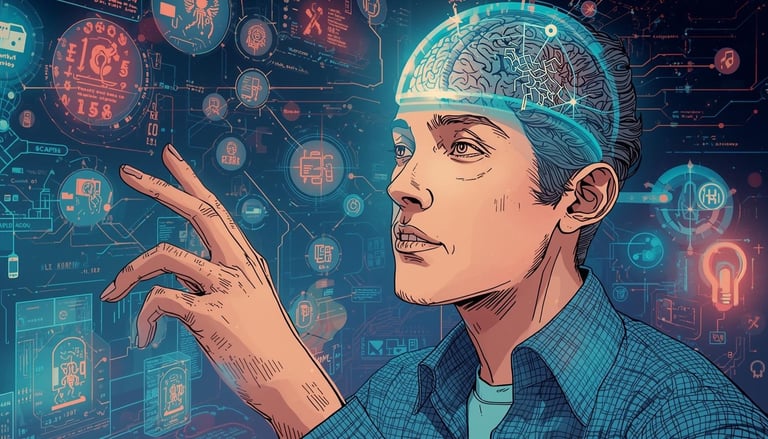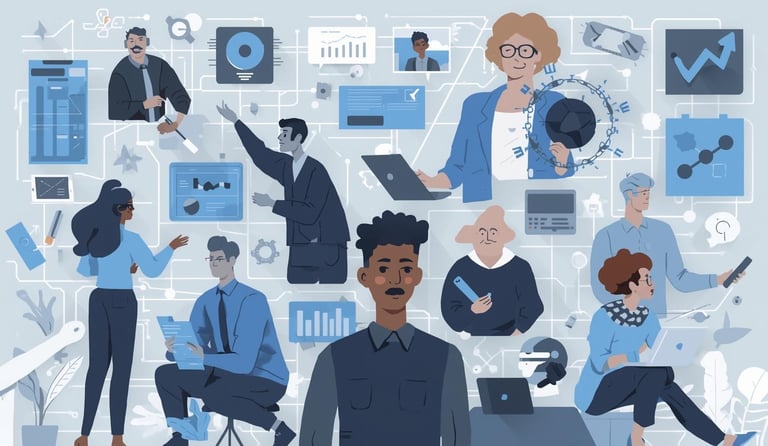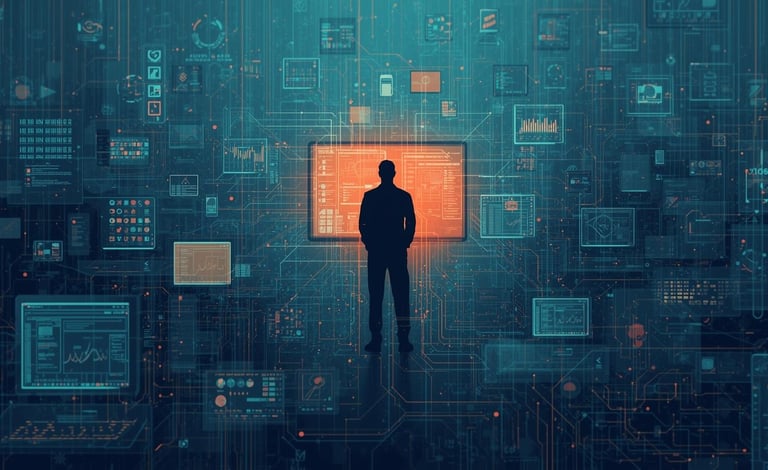Living with Digital Brains: The Human Experience in a Tech-Driven World
"Living with Digital Brains: Finding Balance in a Tech-First Era" Part 10
Gajanan L. Bhonde
9/6/20258 min read


Introduction to Digital Brains
The concept of 'digital brains,' often synonymous with artificial intelligence (AI) and machine learning, refers to systems designed to mimic human cognitive functions. These sophisticated technologies have rapidly emerged as vital components of contemporary life, fundamentally altering how we interact with the world around us. The rapid advancement in AI creates a paradigm shift in various sectors, ranging from healthcare and finance to education and social media. With the advent of digital brains, humans are experiencing a transformative relationship with technology, significantly impacting decision-making processes and daily routines.
As digital brains become increasingly integrated into our lives, their implications on social interactions and personal experiences are noteworthy. Tasks that once required human intelligence, such as data analysis, language translation, and even emotional engagement, are being delegated to these digital entities. This shift raises questions about the dependency humans may develop on technology and the potential ramifications for interpersonal relationships and creativity. Nonetheless, these advancements also promise increased efficiency, personalized services, and novel problem-solving approaches, ultimately enhancing the human experience in a tech-driven world.
In essence, the rise of digital brains is not merely a technological evolution; it embodies a fundamental re-evaluation of what it means to be human in an age dominated by machines. The integration of AI in everyday life challenges us to consider ethical dilemmas, governance of technology, and the balance between facilitating innovation and retaining essential human qualities. As we navigate this changing landscape, it is crucial to engage in meaningful discussions about the role digital brains will play in our future, ensuring that technology complements rather than constrains the human experience.
The Benefits of Living with Digital Brains
The integration of digital brains into daily life provides numerous advantages across various sectors, significantly transforming how individuals engage with the world. One of the most notable benefits is observed in healthcare, where digital brains facilitate personalized medicine. They enable healthcare professionals to analyze vast quantities of patient data, leading to tailored treatment plans that enhance patient outcomes. Predictive analytics powered by digital brains allow for early diagnosis and efficient management of diseases, ultimately saving lives and reducing healthcare costs.
In the domain of education, digital brains are revolutionizing learning methodologies. They offer personalized learning experiences that adapt to individual student needs, ensuring that each learner can progress at their own pace. Access to interactive resources, including simulations and virtual labs, fosters deeper understanding and engagement with complex subjects. Furthermore, digital brains serve as unparalleled sources of knowledge, providing instant access to a wealth of information that can enhance both formal and informal education.
Workplaces also experience considerable benefits from the integration of digital brains. These technologies supply tools that improve productivity by automating repetitive tasks, allowing employees to focus on more strategic aspects of their work. Digital collaboration tools powered by artificial intelligence streamline communication, enhancing teamwork across geographical barriers. Moreover, digital brains can facilitate creative processes by providing insights and suggestions that inspire innovative thinking and problem-solving.
Additionally, the realm of entertainment has been impacted by digital brains, which enhance user experiences through personalized content recommendations and virtual reality environments that elevate engagement. The ability to curate experiences based on individual preferences has made access to knowledge and recreation more enjoyable and tailored. Overall, living with digital brains not only fosters improved efficiency and creativity but also enriches the human experience across multiple areas of life.
The Risks of Over-Dependence on Technology
As society increasingly integrates digital brains into daily life, a growing concern is the potential for over-dependence on technology. This reliance can significantly impact human connection, often fostering a preference for virtual interactions over genuine, in-person engagements. The consequences are multifaceted, influencing emotional well-being, social skills, and humanity's fundamental approach to relationships.
One clear risk associated with this over-reliance is diminished face-to-face communication. As individuals increasingly interact through screens, meaningful conversations may decline, resulting in a lack of vital non-verbal cues that enhance understanding and connection. This shift can lead to feelings of isolation, as many individuals may find solace in the digital realm, yet struggle with interpersonal relationships when these skills are required in the physical world. Consequently, the ease of virtual communication can inadvertently create barriers, making it challenging for people to connect in more traditional settings.
Moreover, the ethical dilemmas stemming from digital dependency warrant consideration. With technology often making decisions on behalf of users or automatically filtering information, individuals may lose the ability to think critically or form independent opinions. This shift raises questions about autonomy and responsibility when it comes to technology's influence over personal choices and judgment. As society embraces AI and machine learning, a reliance on these systems could supplant human intuition and creativity, leading to a homogenized perspective that detracts from the unique insights diverse individuals bring to the table.
In this technology-driven era, understanding the balance between utilizing digital brains and maintaining authentic human connections is paramount. It is crucial to foster awareness of the risks tied to over-dependence on technology to promote healthier social interactions and ethical considerations in a rapidly evolving world.
Ethical Dilemmas: Autonomy, Privacy, and Identity
In an era where digital brains are increasingly integrated into everyday life, the ethical dilemmas surrounding autonomy, privacy, and identity have become paramount. The incorporation of artificial intelligence and neural technologies into the human experience has fundamentally altered our understanding of what it means to possess autonomy. As individuals interact with and depend on these digital counterparts, questions arise regarding the extent of their free will. Are choices truly autonomous when influenced or even dictated by algorithms? This notion becomes particularly critical when considering the implications for personal decision-making and the integrity of individual thought.
Privacy, another crucial ethical concern, is inevitably intertwined with the use of digital brains. The processing capabilities of these systems often rely on vast amounts of personal data. As such, individuals may find their private information increasingly exposed or exploited without their full consent or understanding. The potential for surveillance and data manipulation introduces a precarious balance: individuals must remain vigilant to safeguard their personal information while simultaneously reaping the benefits provided by such technologies. Thus, establishing comprehensive privacy frameworks becomes essential to ensure the responsible use of digital brains.
Furthermore, the impact of digital brains on personal identity cannot be overlooked. As technology increasingly mediates human interactions and influences self-conception, it compels us to question what constitutes authentic identity. Do digital beings diminish or enhance the essence of humanity? The evolution of interpersonal relationships and self-perception in a tech-driven world raises essential inquiries about the authenticity and continuity of identity. It is imperative for society to address these multifaceted dilemmas proactively, fostering a dialogue that considers the ethical implications of integrating advanced technologies with human life. By doing so, we can better prepare to navigate the complexities of a future influenced by digital brains.
Strategies for Achieving Balance
In a world increasingly influenced by digital brains and artificial intelligence, it is imperative to create a harmonious coexistence between technology and human life. Achieving this balance can be facilitated through several effective strategies aimed at mindful use and ethical consideration of digital tools.
First and foremost, practicing mindful use of digital tools is essential. This involves being conscious about how and when technology is used. Engaging in self-reflection can help individuals assess their digital habits, making it easier to identify excessive use or distractions. Techniques such as digital detoxes, where individuals periodically disengage from all digital devices, can encourage deeper connections with the physical world and improve mental well-being. Setting specific times for technology use can also contribute to more focused interactions with digital brains, leading to increased productivity and reduced stress.
Moreover, establishing clear boundaries between work, learning, and entertainment is vital in managing the influence of technology. Clear delineation can prevent overlap, which often leads to burnout. Creating a dedicated workspace free from entertainment distractions, and allocating specific hours for leisure activities can enhance efficiency while promoting a healthier work-life balance. This strategy aids in maintaining a structured daily routine that is essential in a tech-driven environment.
Finally, transparency and ethics in AI development should be promoted to nurture trust in the digital tools that increasingly dictate modern life. Engaging with policymakers and technologists, individuals can advocate for the ethical creation and deployment of AI systems. This includes supporting initiatives that emphasize data privacy, accountability, and inclusivity in AI technologies. A collaborative approach to advancing ethical practices will ensure that advancements in digital brains align with human values while providing meaningful benefits.
The Role of Society in Navigating Technology
As society rapidly evolves alongside technological advancements, particularly the integration of digital brains—systems that augment human cognitive capabilities—the responsibilities of various stakeholders become paramount. It is essential for individuals, tech companies, and policymakers to take an active role in harnessing these tools in ways that enhance human life without compromising core social values and human connections.
Individuals have a crucial responsibility to critically evaluate their interactions with technology. This involves being conscious of how digital brains can influence cognitive processes and decision-making. By fostering a balanced relationship with technology, users can maximize its benefits while remaining vigilant against potential drawbacks such as dependency or privacy violations. Furthermore, individuals should advocate for digital literacy that promotes informed usage, thus empowering communities to engage more meaningfully with these advancements.
Tech companies, on the other hand, hold significant power in shaping the landscape of technology. They must prioritize ethical considerations in the design and deployment of digital brain technologies. This includes ensuring transparency in algorithms, protecting user data, and cultivating an inclusive environment that benefits all demographics. Such commitments will not only improve consumer trust but will also promote long-term societal benefits as technology becomes an extension of human capability.
Policymakers play a pivotal role in establishing a regulatory framework that ensures the responsible use of technology. By implementing guidelines that protect citizens' rights and facilitate innovation while upholding ethical standards, governments can create a landscape where technological progress aligns with social well-being. Open dialogue among stakeholders is essential to navigate the complexities that arise with digital brain integration, as collaboration often leads to better outcomes for society as a whole.
Ultimately, navigating the challenges posed by digital brains requires concerted efforts from all members of society. By working together, we can foster a future where technology serves to enhance the human experience while preserving the connections that bind us together.
Conclusion: Embracing Technology Responsibly
As we navigate a world increasingly dominated by technological advancements, it is imperative to recognize the profound implications of living with digital brains. These sophisticated systems have the potential to amplify our experiences, facilitate communication, and enhance our productivity in myriad ways. However, the rapid integration of technology into daily life prompts critical questions about our relationship with it. Adopting a balanced perspective on technology necessitates a nuanced understanding of its advantages and limitations.
Throughout this discourse, we have explored how digital brains serve as augmentations of human cognition, enabling us to process vast amounts of information efficiently. Yet, the reliance on these digital entities raises concerns about cognitive overload and social isolation. It is essential to actively mitigate these issues by establishing boundaries that promote healthy technology usage. For example, one might consider allocating specific periods for digital engagement, ensuring that face-to-face interactions are prioritized alongside virtual communications.
In fostering a responsible relationship with technology, we must also consider ethical implications and the potential for digital inequities. The digital divide—marked by disparities in access to technology—must remain at the forefront of our consciousness as we strive for an inclusive society. Moreover, developing the ability to critically assess the information provided by digital brains is vital in combating misinformation and maintaining informed decision-making processes.
In conclusion, embracing technology responsibly requires intentional actions and thoughtful considerations. While digital brains can undoubtedly enhance the human experience, it is crucial to strike a balance that allows for healthy human connections and cognitive autonomy. By being mindful of our technology interactions, we can harness the benefits while safeguarding against the risks that may accompany a tech-driven existence.










